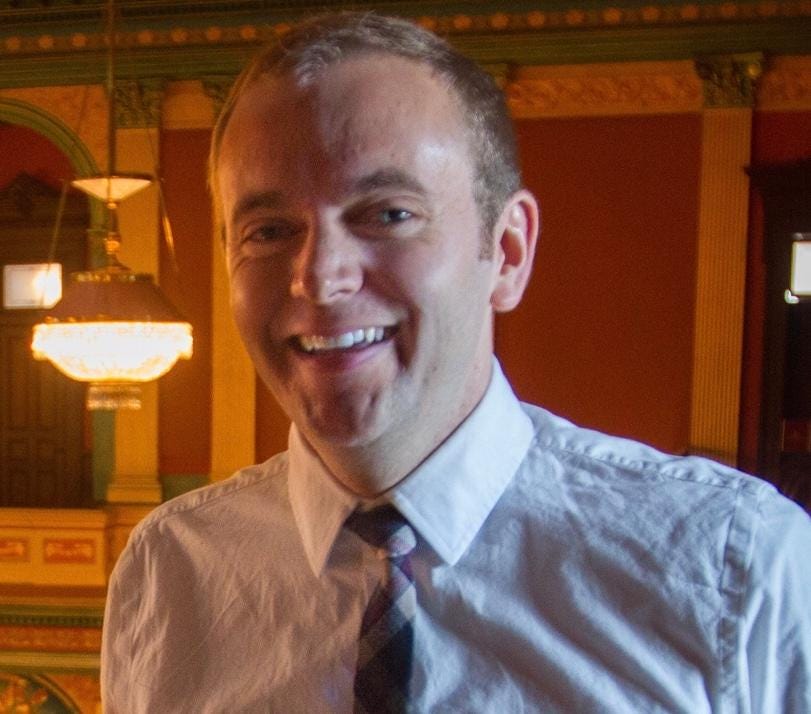Some Michigan lawmakers say it's time to ban political contributions by DTE, Consumers
 Craig Mauger
Craig MaugerLansing — A group of Democratic lawmakers unveiled bills Thursday, aiming to ban Michigan's influential electric utilities, including DTE Energy and Consumers Energy, from making political contributions.
The proposals, which could face opposition from legislative leaders on both sides of the aisle, would mark a seismic shift in Michigan government. In the last decade, DTE and Consumers, which benefit from strict government-set limits on competition, have been among the largest political spenders in the state and have scored a series of policy wins.
Two politically focused nonprofit organizations tied to DTE and Consumers combined to spend $9.4 million in 2022 alone, according to filings with the Internal Revenue Service. Of that total, the two groups gave $950,000 to a nonprofit connected to Democratic Gov. Gretchen Whitmer.
At a press conference in Lansing, state Rep. Dylan Wegela, D-Garden City, argued that Michigan had some of the worst energy services and highest rates in the Midwest because of the utilities' successful efforts to influence lawmakers.
"This legislation will force utility companies to focus on improving their services instead of increasing their profits," said Wegela, the lead sponsor of the bills.

The measures would prohibit electric and natural gas utilities from contributing money to candidates, political parties and nonprofit social welfare organizations or political accounts tied to state officeholders, their staff or family members.
DTE spokesman Peter Ternes said the utility's "political giving is transparent and within all campaign finance limits."
"Like most other organizations, DTE participates in the electoral process to advocate to provide safe, reliable, affordable and clean energy for the 3 million plus Michigan residents and businesses it serves every day," Ternes said.
Consumers spokeswoman Katie Carey said the Jackson-based company is "all in on Michigan's prosperity."
“We strive to conduct our business in a transparent way, including our participation in the legislative and political process," Carey said.
For years, organizations affiliated with DTE and Consumers have written checks to political funds on both sides of the aisle. In 2022, for example, Michigan Energy First, which is connected to DTE, reported giving $1.1 million to an account of the Michigan Democratic Party.
Ternes confirmed last year that DTE made contributions to Michigan Energy First.
"These contributions do not get charged to our customers but are instead allocated to shareholders," Ternes said in a statement.
Citizens for Energizing Michigan's Economy, a nonprofit tied to Consumers Energy, gave $200,000 in 2022 to Citizens for a Better Michigan, an account tied to Michigan House Democrats or, specifically, House Speaker Joe Tate, D-Detroit. Tate would have the authority to decide whether to advance Wegela's new bills.
Carey previously said money the utility gave to Citizens for Energizing Michigan's Economy came from shareholders, not customers' bills.
The contributions to the nonprofits in 2022 flowed ahead of a wave of outages that left more than 900,000 people without power in Michigan in February 2023 and ahead of lawmakers approving a rewrite of state energy laws in November.
The changes impose a new 100% clean energy standard for utilities to hit by 2040 and make it easier for them to pursue large-scale wind and solar projects. In a presentation to shareholders earlier this month, Consumers' parent company, CMS Energy, described the legislation as "good for all stakeholders."
Three Democratic lawmakers appeared at Thursday's press conference at a church in downtown Lansing: Wegela, Rep. Emily Dievendorf of Lansing and Sen. Jeff Irwin of Ann Arbor. A coalition of groups called Taking Back Our Power organized the event.

Irwin argued that the utilities' money had made it difficult to push for clean air and clean water in Lansing.
"I've seen the polluting power of utility money in politics for too long," Irwin said. "That's why I support this kind of change."
Asked whether the bills could withstand a potential challenge alleging they improperly limit the utilities' freedom of speech, Wegela said other states have already placed regulations on utilities' political spending. Colorado has prohibited investor-owned utilities from using ratepayer money on political efforts, according to the nonprofit watchdog group Energy and Policy Institute.
Likewise, for about two decades, Michigan law banned those with financial interests in highly regulated casinos from making political contributions. Lawmakers lifted that prohibition in 2019.
Also, the Michigan Public Service Commission, which regulates electric utilities in the state, approved a settlement agreement in a 2019 Consumers Energy rate case that temporarily prohibited the company from donating to nonprofit political advocacy groups, according to a spokesman for the commission.
Consumers gave $35 million to the nonprofit Citizens for Energizing Michigan's Economy across 2016 and 2017 before the agreement took effect, according to tax filings.
The 2019 settlement agreement came after Citizens for Energizing Michigan's Economy bankrolled a campaign against state Rep. Gary Glenn, a Republican from the Midland area, in 2018. Glenn, one of the utilities' most vocal critics in the Legislature, was seeking a seat in the state Senate.
Citizens for Energizing Michigan's Economy reported giving $5.4 million to a group called Faithful Conservatives for Michigan. The group aired TV advertisements, sponsored radio advertisements and sent out mailers critical of Glenn in his primary race, which Glenn ended up losing to state Sen. Kevin Daley, R-Lum.
On Thursday, Dievendorf pushed against the idea of being fearful of the utilities funding a campaign against supporters of the new bills later this year. Dievendorf said they were "used to hearing rumors of threats."
"We certainly trust our constituencies to let us know what they need, and everything that we do is in response to what our constituents say that they need," Dievendorf said. "We trust that our constituents will come out and support us if we're doing the right thing and we're coming down on the right side of history."
cmauger@detroitnews.com